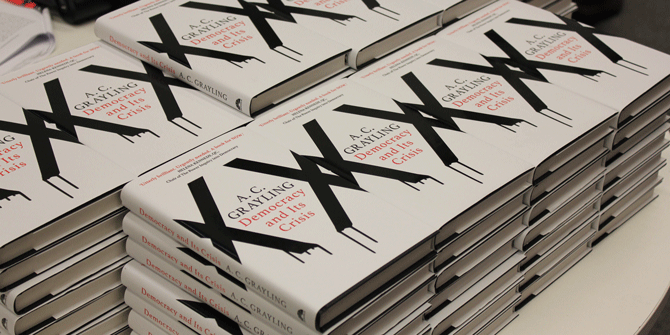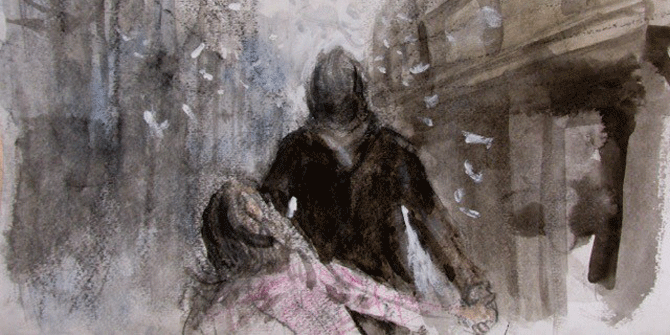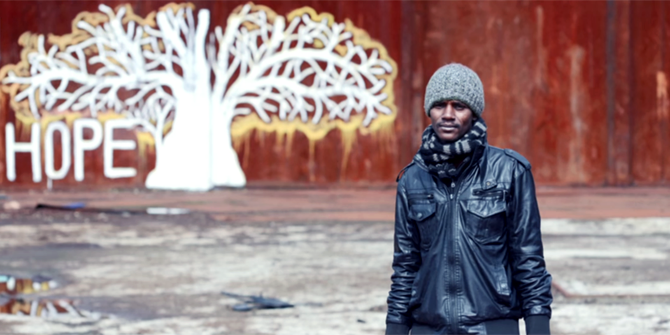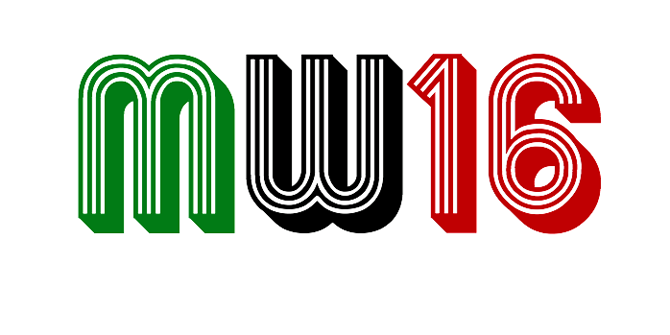MSc student Bhargav Sriganesh reflects on AC Grayling’s public lecture at LSE, which took place on Thursday 5 October 2017 and was titled ‘Democracy and Its Crisis’.
Since the election of Donald Trump and the Brexit referendum it has become fashionable for universities to debate if democracy in its current form is in crisis. This is not an untoward development. Liberal elites in universities are coming to grips – emotionally and intellectually – with the unprecedented events of last year. Therefore, I entered AC Grayling’s lecture at LSE on Thursday 5 October with a well-justified weariness. Nevertheless, his lecture did not disappoint. It was an incisive lecture that demonstrated how representative democracy has been weakened significantly in the UK and US.
Grayling’s speech could be roughly divided into two main parts. The first part was primarily concerned with tracing the historical evolution of “Democracy” – in all its multi-faceted incarnations – as a system of governance. As is often the case, the starting point of his analysis was from the Athenian democracy in the 5th century. Even then, Plato, as Grayling pointed out, was sceptical and concerned that investing power in the demos (people) would degenerate into “mob rule”. The Platonian scepticism was rooted in the fear that all the conflicts in society would lead to tumult and eventually result in a tyrant stepping in to consolidate power. Thus, “ordinary people”, often not well-informed or self-sufficient, will embrace tyranny in response to anarchy. Questioning the intelligence of voters has become a timeless practice in history. As Winston Churchill quipped, “The strongest argument against democracy is a three minute conversation with the average voter.” Here, we could have potentially been bogged down by some semantic sophistry to precisely define what is meant by terms such as “ordinary people” or “average voter”. Thankfully, Grayling steers away from this and addresses the more fundamental issue of how the notion of the “average voter” has changed progressively with the gradual, and at times glacial enfranchisement of the population.
Grayling’s primary focus was on how universal suffrage, which empowered members of society to express their diverse preferences, could be translated into a workable system of government through legislative, executive and judicial institutions in a representative democracy (I.e. Congress, Parliament, Upper House, President, Prime Minister, and Supreme Court). By delving deeply into the conceptual basis of a representative democracy, he makes the subtle but significant distinction between representatives and delegates. In a representative democracy, members of a parliament or Congress are not delegates who are assigned to complete tasks. Rather, they are representatives who have been vested with the responsibility to take decisions on our behalf in parliament.
This conceptual delineation dovetailed neatly with the second part of his lecture. In the first half, his scholarly dispassion was probably held strong by his detachment from the subject matter. However, from the time he started to discuss the foibles of modern-day democracy, his veneer of impartiality, gave way to a bitter distaste, or perhaps aftertaste, for Brexit and Trump. This is not surprising or wrong. It is a cognitive bias and one that Grayling tangentially acknowledges repeatedly.
Regarding Brexit, he lambasted the legitimacy of the “Leave” vote and questioned if it was necessary to hold the referendum in the first place. Furthermore, since the Briefing Paper circulated to parliament in 2015 clearly stated that the referendum was only advisory, the Brexit Ministry’s decision to treat the result as binding was explicitly contravening the Referendum Act. In his view, there was no compulsion for the government to make this decision since only 37% of the restricted electorate given the franchise for the referendum voted to leave the EU. Yes, it is certainly true that the Referendum Act could have stipulated a higher turn out or vote share threshold to secure a decisive mandate and Parliament.
In this case, can elected representatives defy the will of their constituents after politicians repeatedly framed the referendum as an important mechanism to make the binary choice of staying or leaving the EU? Grayling did say that Members of Parliament should have exercised their independent judgement and not bowed down to pressures from the Party Whip during the debate to trigger Article 50. This is a noble and noteworthy suggestion. Still, as a matter of principle and pragmatic self-interest, it is difficult to justify a MP not voting to trigger Article 50, especially if a majority in her constituency voted to “Leave”.
However, for Grayling, the disagreement with the Brexit vote stems only partially from the result. While the result might have prompted him to write this book, his primary objection is to the arbitrary manner in which the referendum was called by David Cameron to placate the festering Euroscepticism within the Conservative Party’s ranks. Thus, he called for a written constitution in the UK that would codify and consistently dictate the circumstances under which a referendum should be held. The debate over whether the UK should have a written constitution has sustained the careers of many legal scholars and this is not the place to elaborate on the arguments on both sides. Still, Grayling’s essential argument is a very compelling one. There has been a growing fetishisation with referenda and UK seems to have been a trailblazer in promoting this fad.
Grayling’s final assault on modern-day democracy targeted the malignant forces of Big Data that led to the election of Trump. According to him, Trump’s victory was partially if not wholly due to the weaponising of misinformation, spin and rhetoric. The hypertargeting of voters and proliferation of subliminal political messages could amount to covert propaganda.
There is no doubt that the scourge of fake news, perpetuated often by the current President of the US himself, diminishes the quality of democracy. Nevertheless, I have my doubts about Grayling’s claim that voters stripped of agency due to Big Data mechanisms, would fall prey to hypertargeting and vote in a particular way. How much of “agency” is truly lost in hypertargeting since this is an iterative process based on the preferences of voters? How important are campaigns in the first place since most voters have predetermined preferences? Are social media habits of citizens reliable predictors of the way they vote?
To conclude, Grayling, in his lecture stated that sensible human beings are meliorists and not perfectibilists. Essentially, sensible human beings do not expect perfection but strive to make things better. Similarly, Grayling’s diagnosis of democracy’s ailments and prescriptions to alleviate the current crisis were not always perfect. Regardless, he never failed to provoke thought, challenge conventional thinking and propose alternative solutions that would make the situation better. Most importantly, it was heartening to see someone preferring a cacophonous democracy to the deafening silence of tyranny at a time when the liberal order, around the world, is threatening to be dislodged by polarising socio-political and economic forces.
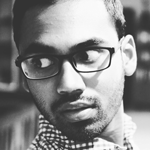 Bhargav Sriganesh is a postgraduate student reading Political Science and Political Economy. His research interests revolve around the economic, social, political and geo-strategic developments in Southeast Asia.
Bhargav Sriganesh is a postgraduate student reading Political Science and Political Economy. His research interests revolve around the economic, social, political and geo-strategic developments in Southeast Asia.
Note: this article gives the views of the author, and not the position of the LSE Department of Government, nor of the London School of Economics.


